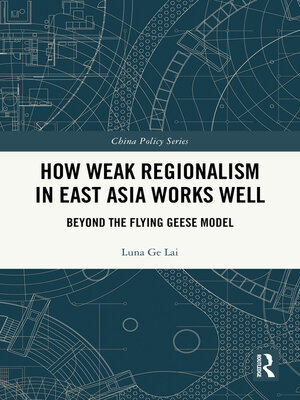How Weak Regionalism in East Asia Works Well
ebook ∣ Beyond the Flying Geese Model · China Policy Series
By Luna Ge Lai

Sign up to save your library
With an OverDrive account, you can save your favorite libraries for at-a-glance information about availability. Find out more about OverDrive accounts.
Find this title in Libby, the library reading app by OverDrive.



Search for a digital library with this title
Title found at these libraries:
| Library Name | Distance |
|---|---|
| Loading... |
This book investigates the reasons why regionalism in East Asia has been much weaker than in Western Europe and North America. It focuses particularly on economic factors, examining the regional and global linkages of production networks.
Through a focused exploration of regional and global production networks, it argues that East Asia was not as regionally concentrated as was Western Europe or North America, lacking a regionally oriented productional basis to support the institutional arrangement of East Asia as a stand-alone economic community. Moreover, the regional production networks of each national economy in the region are influenced by a different set of value-added components from different global and regional origins. This divergence in their positions accounts for the mushrooming of divergent initiatives and projects for regional institutional arrangement. Finally, the institutional choices of the states to join Comprehensive and Progressive Agreement for Trans-Pacific Partnership (CP/TPP) and/or Regional Comprehensive Economic Partnership (RCEP) are found to be strongly influenced by the sectoral focuses and priorities of their economies.
Demonstrating how the unique economic factors of each nation override other considerations for greater regional integration, this book will be a valuable resource to students and scholars of international trade, Asian politics and economics.







